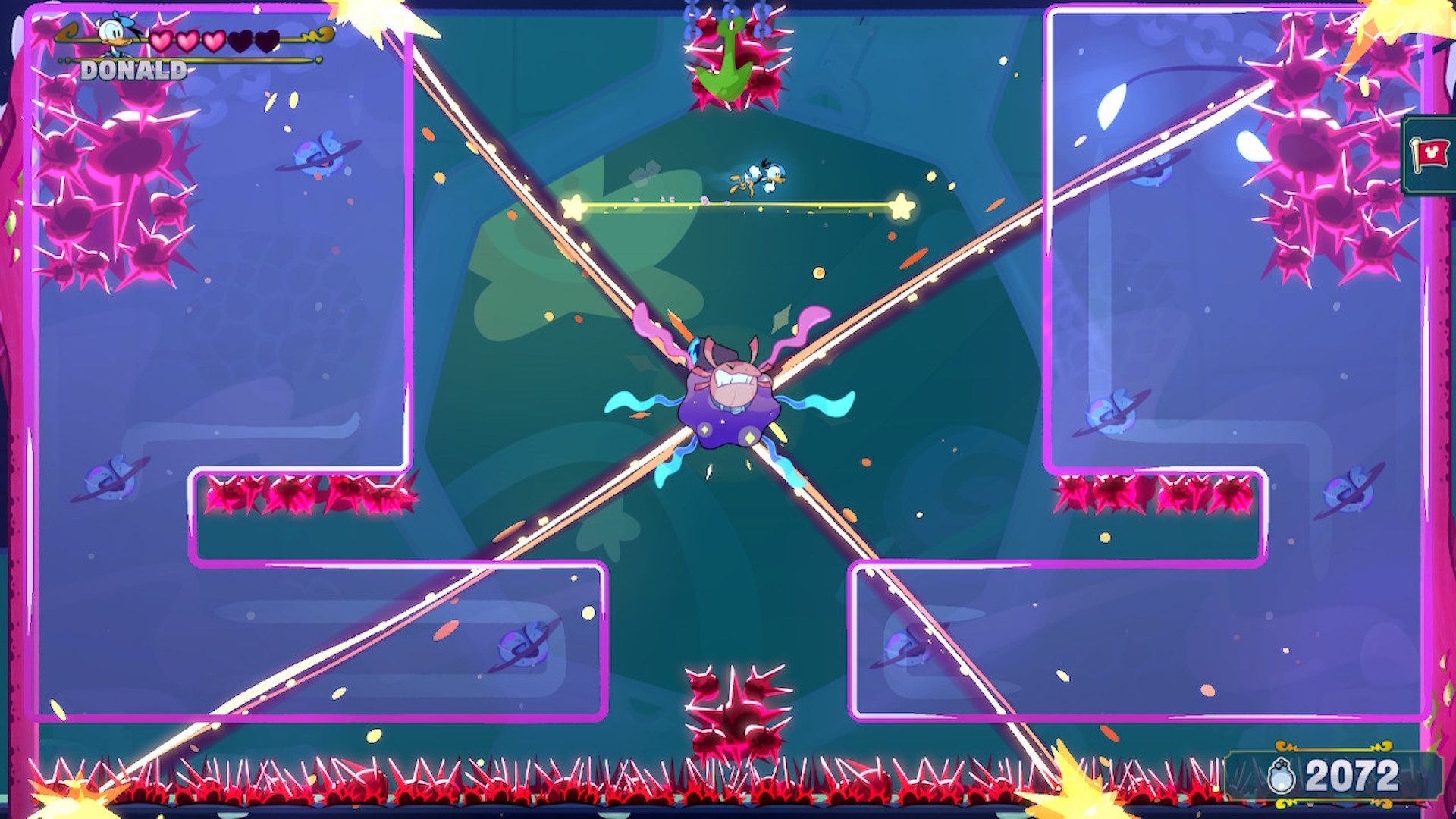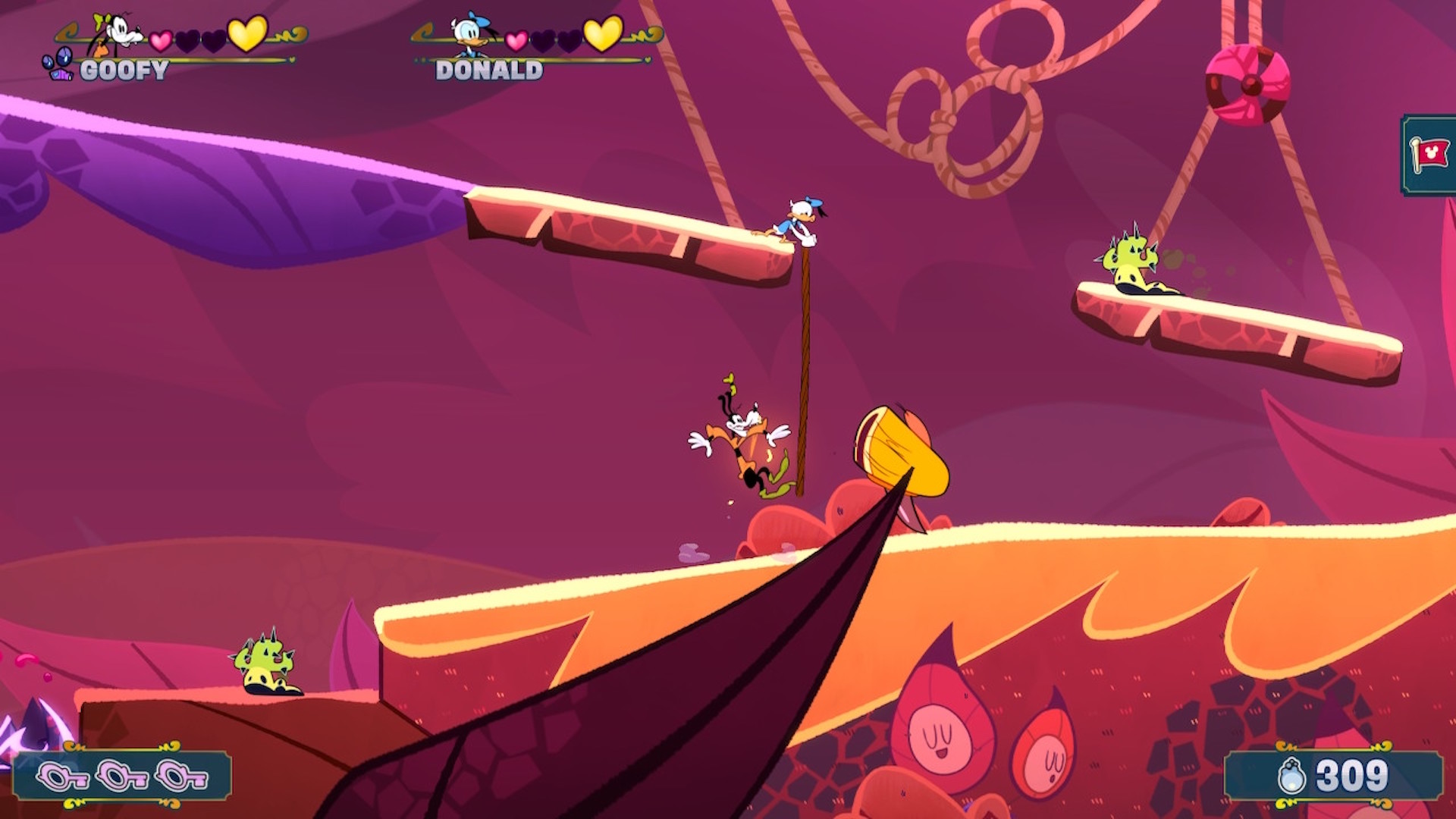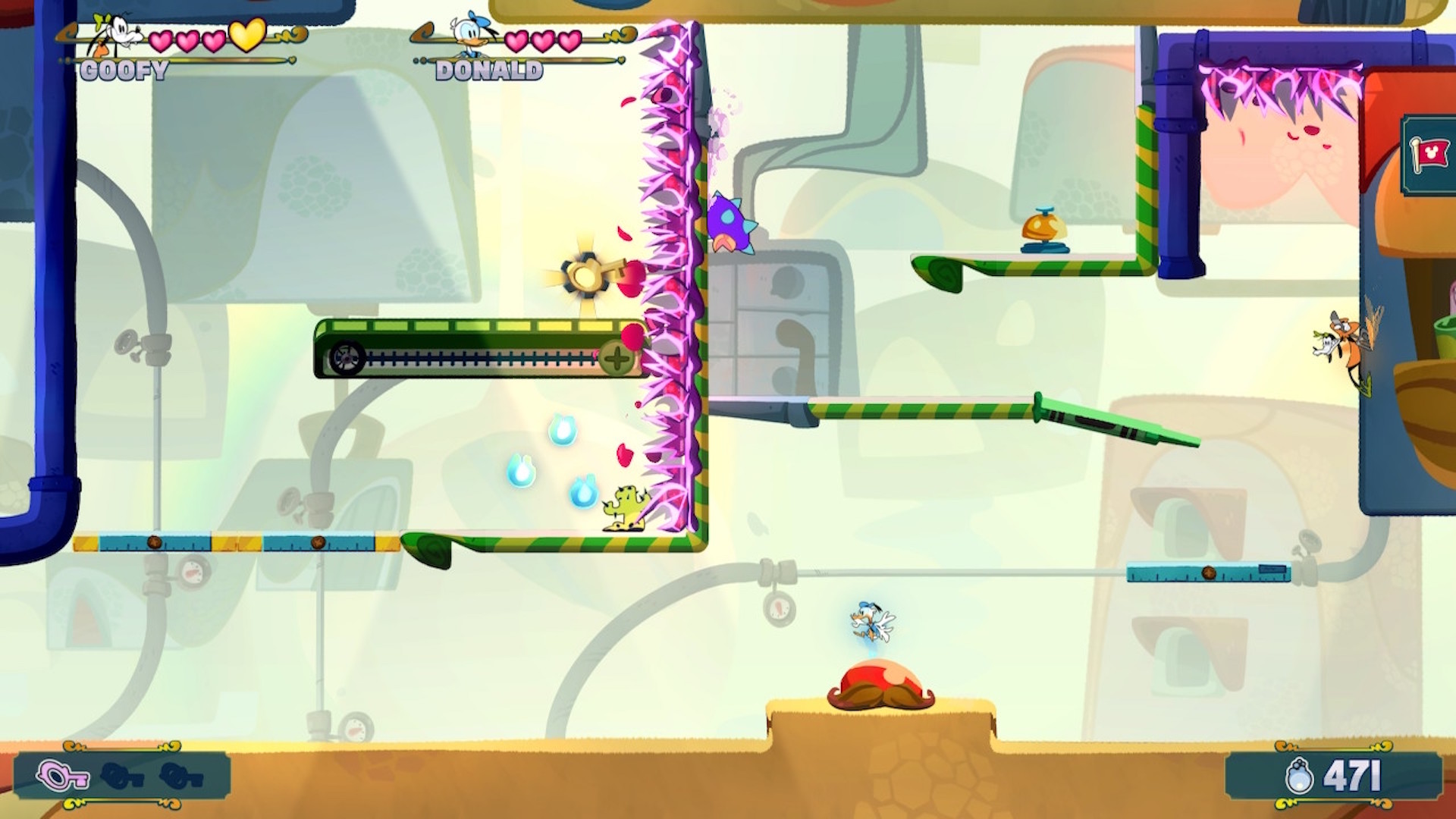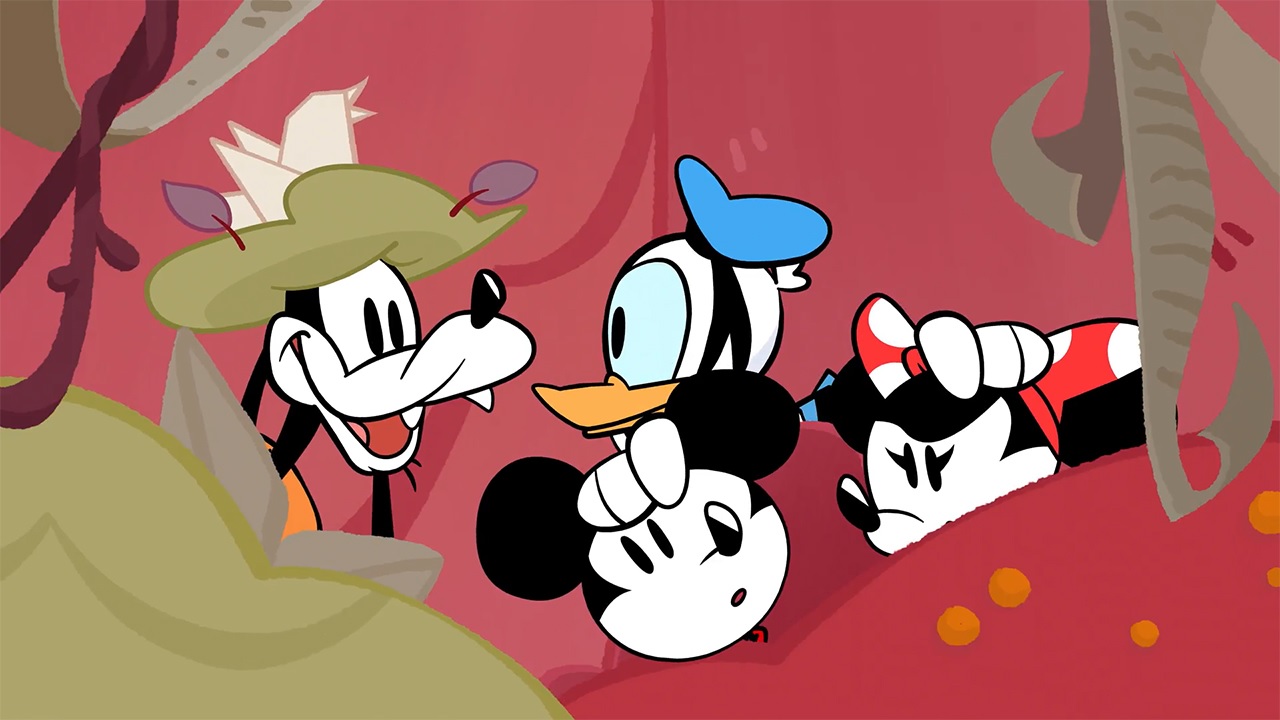GamesRadar+ Verdict
A cute My First Metroidvania with charming characters, wrapped up in some fairly basic and uninspired platforming levels. It's not Illusion at its best, but should entertain kids.
Pros
- +
Characters have loads of personality
- +
Fun to jump around
- +
Lots of assist options
Cons
- -
Basic environment design
- -
Co-op doesn't add much
- -
Peters out by the end
Why you can trust GamesRadar+
Can you name the platformer mascot star who helped propel the genre to new heights, whose name begins with an M? Mario!? Mario, who? It's Mickey Mouse, head of the House Of M himself. Not only did the red shorts wearing rodent lay the groundwork for what a modern mascot star could even be long before a certain mustached plumber donned his similarly bright overalls, but Mickey's been starring in video games for almost as long. The mouse is perhaps best known in video game circles for Sega's 8-bit and 16-bit Illusion titles, and while Disney Illusion Island is a revival of sorts that'll delight kids it does fall short of rejuvenating the beloved retro series.
Developer: Dlala Studios
Publisher: Disney Interactive Studios
Platform: Nintendo Switch
Release date: July 28, 2023
Disney Illusion Island stars Mickey Mouse alongside pals Minnie Mouse, Donald Duck, and Goofy. Sporting simplified designs, both the animation and comedic writing feel in keeping with the 2013-2019 Mickey Mouse TV show. In cutscenes their constantly squashing and stretching facial expressions are wonderfully expressive (the grumpy Donald's drooping duck bill is a delight), and while the script's meta jokes can grate (like lampshading the "arbitrary" nature of some developments or referring to things as "callbacks") it's still chuckle-worthy and should keep children entertained.
The excellent animation on display in the cinematics carries through to the game in motion. Each of the four heroes has their own distinct run cycle packed with personality and, as you unlock skills to help you traverse the Metroidvania-style island, each one's tools are bespoke (while remaining the same in function). Mickey, for example, can boost jump with a short-range jetpack that has him briefly snap on goggles, while Goofy for some reason thrusts his hips into a red-hot chili pepper. They're fun, distinctive flourishes, and with quite a lot to unlock in order to access more parts of the expanding map, they really add up – it's excellent detail, and quite the sight to see all four animating differently, popping off their own moves in sequence as they jump from one platform to the other.
Mickey and friends

Indeed, the Metroidvania-structure isn't the only change-up to the level-based fare that came before. Disney Illusion Island is fully playable with four players, enabling some multiplayer-specific moves such as an entirely pointless leapfrog jump, and a much handier hug, a Kirby-like embrace that rewards players with an extra heart of health over their current maximum. A rope can also be deployed to haul other players to higher levels – perfect for if a jumping sequence is too much for a little one (though if anyone falls off screen, they jump into a magic envelope to fly towards the lead character, where they reappear).
Disney Illusion Island can be played with any number of players from solo to the full four, without the core design or challenge really changing at all. That does mean there's not much depth to the actual multiplayer in and of itself. While the rope move may nod to 1992's World Of Illusion, players are never required to work together as they were in that opus (well, I liked it a lot anyway – both Mickey and Donald had their own variants on the main campaign, plus one co-op route where they were forced to drop ropes and provide boosting leg ups aplenty). The co-op works best in the odd room where there are multiple collectibles to hoover up, and boss battles where multiple targets spawn you need to bash to disable them.
Other than that, you're mostly all just hopping one after another down fairly straightforward routes, occasionally skidding to a halt when you notice a hidden pick-up behind a bit of foreground. Disney Illusion Island is often quite frictionless; even though you'll only take five or six hours to hit credits, what you're doing can get quite repetitive. The powers you unlock are expected platforming fare – a wall jump, swimming, a glide, etc – and the objectives usually just ask you to head to one corner of the map, where you'll usually find you need a certain power and then be rerouted a little bit in order to obtain it. Along the way you'll continuously come up against locked doors that always require three keys from nearby challenge rooms. There's little to surprise.
Tour guide

You'll need the map a fair bit purely because the level design is bland enough for you to easily get a touch turned around. While visually each of the three biomes has some fun stuff going on, the platform level design doesn't move far beyond what you might scribble in the back of a maths book, and even the odd biome-specific hazard doesn't provide much in the way of personality. It's a shame as past games in the series were much better at making you feel part of a space (the gorgeous forest at the start of World springs to mind). It doesn't feel like you're exploring an interactive cartoon, merely navigating cartoon characters through fairly rigid geometry.
The extremely zoomed out perspective doesn't help (good luck playing on Nintendo Switch in handheld mode), which is present even when playing solo. But you do, at least, zip around quickly, and the movement feels great and responsive. Die or take a whack and you'll almost always feel like you yourself were to blame. Combine that with an almost entirely pacifist approach that sees you avoiding dangerous, often spiky enemies rather than fighting them, and the shifting gauntlets of jumps can feel good to worm your way through (even if they never offer much of a challenge).
Still, as the moves add up, you start to feel the lack of, say, Mario's elegant and simple controls. The multitude of moves all mapped to different buttons (the jump boost is on B, while the glide is on Y, for instance) risk becoming over-complicated for younger players.
Sinking feeling

Mostly inoffensive, the loop of jumping towards an objective and occasionally nabbing a slightly off the beaten path collectible (many of which reference classic Disney cartoons) is enjoyable enough. It's a shame then that the final main portion of Disney Illusion Island dumps you unceremoniously into a lengthy underwater sequence without that pleasing cadence, and then into a final challenge gauntlet that's so stop-start with story scenes that it's hard to appreciate the dialed up platform challenge.
Disney Illusion Island is a lightweight Metroidvania perfect for kids. It's not as good as its more level-based Illusion predecessors; nor is it as good as the true titans of the genre like Castlevania: Symphony of the Night. But, I also wouldn't expect eight-year olds to get on with those classics as much as this. While I'd have loved Illusion Island to feel a bit more like a cartoon world and less like a sketch on a napkin, it's Mickey's best platformer in a long time. However, for now, it's Mario who clings onto the M-belt.
Disney Illusion Island was reviewed on Nintendo Switch, with code provided by the publisher.
More info
| Genre | Platformer |

Games Editor Oscar Taylor-Kent brings his year of Official PlayStation Magazine and PLAY knowledge. A noted PS Vita apologist, he's also written for Edge, PC Gamer, SFX, Official Xbox Magazine, Kotaku, Waypoint, GamesMaster, PCGamesN, and Xbox, to name a few. When not doing big combos in character action games like Devil May Cry, he loves to get cosy with RPGs, mysteries, and narrative games. Rarely focused entirely on the new, the call to return to retro is constant, whether that's a quick evening speed through Sonic 3 & Knuckles or yet another Jakathon through Naughty Dog's PS2 masterpieces.



